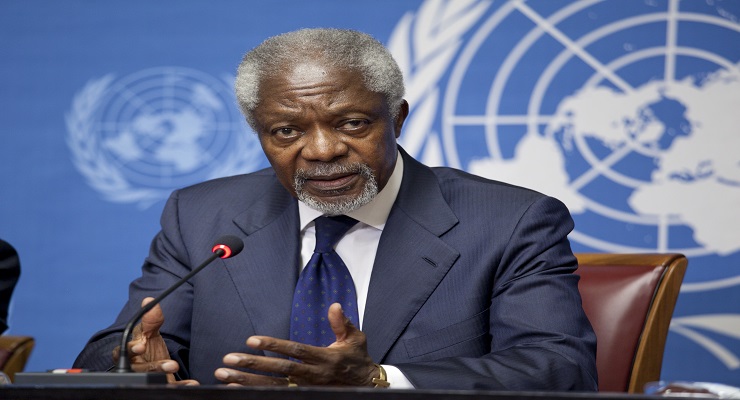
Former U.N. Secretary-General Kofi Annan died Aug. 18 and was buried last week in his home country of Ghana with highest honors. At the United Nations on Friday, the international community and his family remembered Annan as a man of peace who was dedicated to humanity.
Kofi Annan joined the U.N. system in 1962 and spent decades rising through the ranks to become peacekeeping chief and ultimately, in 1997, the organization’s seventh secretary-general.
Current U.N. Chief António Guterres led the tributes to him.
“Throughout his tenure Kofi Annan urged us never to be bystanders in life. He summoned us all to act against bias, brutality and bloodshed. He was a multilateralist through and through,” Guterres said.
The president of Ghana sent Annan Cato as his special representative to the memorial.
“As the first Secretary-General from sub-Saharan Africa, Kofi Annan brought considerable renown to Ghana and to Africa, evidenced by his conduct and comportment in the global arena, especially at difficult periods in the history of the organization,” Cato said.
Achievements and shortfalls
Among Annan’s achievements was his work to mobilize a global response to the HIV/AIDS epidemic and to institute the Millennium Development Goals, which helped make inroads in the eradication of poverty. In 2001, Annan and the United Nations jointly won the Nobel Peace Prize.
But the Rwandan genocide happened on his watch as peacekeeping chief and his tenure as secretary-general was tarnished by the oil-for-food corruption scandal in Iraq.
After a decade at the helm of the U.N., Annan continued to work for peace through his Annan Foundation and with The Elders.
His immediate successor as secretary-general and a fellow Elder, Ban Ki-moon, praised Annan as a “genuine force for global good.”
“I am confident that history will show, as the years pass, that Kofi Annan was a monumental leader,” he said.
Son’s tribute
Annan’s wife of 35 years, Nane, spoke of his “glowing aura of radiant warmth and joy of life.”
But one of the most moving tributes came from his son, Kojo, who said that it was unimaginable that a man born in Ghana’s second city of Kumasi and who never left his country before he was 18 years old would rise to become the world’s top diplomat.
“And yet that was my father’s story,” he said. “It was a story that became his world view. If it was possible for him, why should stability, peace, security, justice, sustenance, education, opportunity or success be impossible for anyone else?”
He said that although his father’s race had ended, his work continued — to build a world where potential is recognized in everyone and everyone can find a home.
Leave a Reply